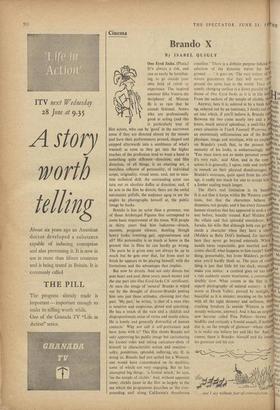Cinema
Brando X
By ISABEL QUIGLY One Eyed Jacks. (Plaza.) !Vs always a risk, and can so easily be humiliat- ing, to go outside your own field of talent or experience. The inspired amateur (like Ventris the decipherer of Minoan B) is so rare that he sounds fictional. Actors who are professionally good at acting (and this is particularly true of film actors, who can be 'good' in the narrowest sense if they are directed almost by the minute and have their performances pruned, shaped and snipped afterwards into a semblance of what's wanted) as soon as they get into the higher reaches of the profession tend to want a hand in something quite different—direction; and film direction, of all things, is an exacting art, a merciless reflector of personality, of individual scope, originality, visual sense, soul, not to men- tion technical skill. An outstanding actor can turn out an absolute duffer at direction; and, if he acts in the film he directs, there are the awful narcissistic pitfalls, the audience agog to see the angles he photographs himself at, the public image he backs.
Brando is less an actor than a presence, one of those Archetypal Figures that correspond to some basic requirement of the times. Will people in thirty years find him ludicrous—slouch, mumble, pregnant silences, dazzling though heavy looks, lowering gait, oppressiveness and all? His personality is so much at home in the present that in films he can hardly go wrong. The parts he is given may not always be up to much but he gets over that, for from start to finish he appears to be playing himself, with the limitations and the advantages that implies.
But now he directs. And not only directs but puts heart and soul, three years, much money and the star part into One Eyed Jacks ('A' certificate). At once the image of 'natural' Brando is wiped out by the thought of director-Brando putting him into just those attitudes, choosing just that part. 'My part,' he writes, 'is that of a man who is intuitive and suspicious, proud and searching. He has a touch of the vain and a childish and disproportionate sense of virtue and manly ethics. He is lonely and generally distrustful of human contacts.' Why not call it self-portraiture and have done with it? This film shows Brando not only approving'his public image but caricaturing his former roles and taking caricature-shots of himself in characteristic action and reaction— sulky, ponderous, splendid, suffering, etc. lf, in doing so, Brando had just settled for a Western, one would have concentrated on its qualities, some of which are very engaging. But he has attempted big things: 'a frontal attack,' he says, 'on the temple of clichés.' And, without apparent irony, clichés loom in the film as largely as the sea which the programme describes as 'the ever- pounding surf along California's thunderous coastline.' There is a definite purpose behind 01 selection of the dynamic waves for hacti ground . . .' it goes on. The very nature of t waters guarantees that they will never twit present the same face to the world Their co° stantly changing surface is a direct parallel tc theme of One Eyed Jacks as it is to life it From the sackers of the temple of clichés, t Anyway, here it is, ushered in by a bank I up, ushered out by an (unironic, I think) red set into which, if you'll believe it, Brando r Between the two come nearly two and a hours, much natural splendour, a snail-like every situation in Teach Yourself Westerns, a an enormously selfconscious use of the Br. od physique, image and mystique, with an empha on Brando's youth that, in the present he eIrnal aaii it's very rude,' said Alice, and in the case `You must learn not to make personal rema maturity of his looks, is embarrassingly iipieaPti)1°4ceaoirneviikeetsi actors it is generally, I agree, rude and irrelc vbil he al to remark on their physical disadvantages; age, is really too much for one to accept hi ll Oarille It is not that it keeps within the Western cot V bile text before, banally treated. Karl Malden Brando's stoutness, quite apart from his oh 1011 it a limber sapling much longer. tions, but that the characters behave lainLre o dummies, not people, and it has every foresee human situation that has appeared in such a c004°111 The film's real limitation is its banali;to of rjellanre bYta nese aijEyeol we ha re le the villain and that splendid smoulderer, learty'lepivrrilicitiejs, Jurado, his wife. But although both can get here they never go beyond externals. When tions, inside a character when they have a than acre, (Malden as Baby Doll's husband, for instance) .x0ti; comes sheriff, what happens to him inside? Sour Inher bandit turns respectable, gets married and covet wecra M, thing, presumably, but from Malden's perforill storm in Death Valley, pierced by sunlight, of h ance you'd hardly think so. The pace of e
thing is just make you notice: a carnival goes on too
deathly slow. What counts in the film ril superb photography of natural scenery: a dus, Iang, with all the right shimmer and earliness; ho Were else is, on the temple of glamour—whose char • a ride suddenly seems wearisome, a conversati0 beautiful as it is sinister; morning on the bea those crashing breakers (a seaside Western is eno and mously welcome, anyway). And it has an origin new heroine called Pina Pellicer—brown an birdlike and certainly a frontal assault, if no hi is to make one believe her and like her. And, 0 that little bit ,too slack, enough book lorignd course, there is Brando--himself and his it -1a64 cant
his presence and his eye. ef,
-e 10
ha at
01 .erld. sginade.
id ants h aat: " tone pl hape'd
and I say without fear-of contradictim,


































 Previous page
Previous page